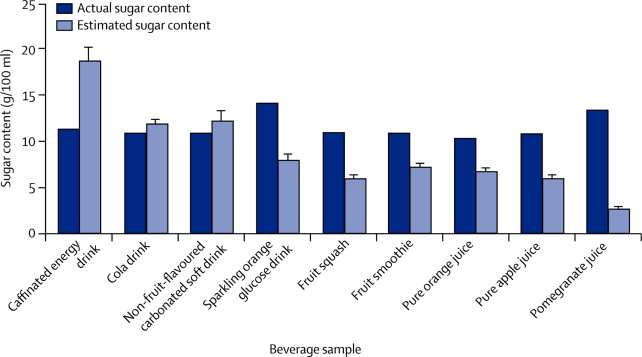In a meeting today, my companion asked me about my views on fruit and fruit juice. In short, my reply was that I think fruit is over-rated, and that fruit juice should generally be avoided. Many of the reasons for my ambivalence about fruit (and why much fruit is anything but some sort of nutritional nirvana) is, for me, well articulated in this blog post by nutritionist Zoe Harcombe. Personally, I do eat some fruit, but I don’t go out of my way to eat it either.
My issue with fruit juice specifically concerns its very sugary nature. Only last month, our attention was drawn to this fact by a comment piece written in the journal Lancet Diabetes and Endocrinology [1]. The authors, from the Institute of Cardiovascular and Medical Sciences in Glasgow, UK, first alert us to the potential for sugary soft drinks (such as cola) to contribute to weight gain (something that they put down to the tendency for these drinks to supply calories that are not compensated for by reduced intake of other foodstuffs). And then they deliver these cool, hard facts:
…fruit juice has a similar energy density and sugar content to [sugar sweetened beverages]: 250 ml of apple juice typically contains 110 kcal and 26 g of sugar; 250ml of cola typically contains 105 kcal and 26·5 g of sugar.
The authors point out that, generally, people tend to underestimate the amount of sugar in fruit juices and smoothies, while generally overestimating the sugar in soft drink. Here’s a graph which represents the results of a study they conducted on this.

These results mirror my own experience: almost everyone I talk to about fruit juice is shocked at how much sugar they contain.
The authors point out that fruit juice and soft drinks are not the same, and that fruit juices may contain vitamins and minerals that could be of value for ‘individuals consuming micronutrient-poor diets’. However, as they also point out, this may not be enough to offset the ‘adverse metabolic consequences of excessive fruit juice consumption.’
The authors go on to say:
…in the UK only the first 150 ml of fruit juice consumed can count towards the five-a-day target—the inclusion of any fruit juice at all as a fruit-equivalent in this recommendation is probably counterproductive because it fuels the perception that drinking fruit juice is good for health, and thus need not be subject to the limits that many individuals impose on themselves for consumption of less healthy foods. Accordingly, we suggest that better labelling of fruit juice containers is needed, to include explicit recommendations on maximum recommended daily intake. A further, more radical suggestion would be to re-examine whether any fruit intake in the form of juices should be permissible within guidelines for daily fruit and vegetable intake. This change would be in line with calls in the USA that recommend elimination of all fruit juice consumption by children.
Overall, I agree very much with the sentiments expressed in this article. And it seems some manufacturers are feeling the heat. Back in 2009, PepsiCo launched Trop50 – a range of fruit juices diluted with water to reduce the sugar content by half (and sweetened with stevia). Over the coming years, I expect to see a growing number of ‘low sugar’ fruit juices and smoothies on the shelves.
References:
1. Gill JMR, et al. Fruit juice: just another sugar drink? Lancet Diabetes and Endocrinology published online 10 February 2014.